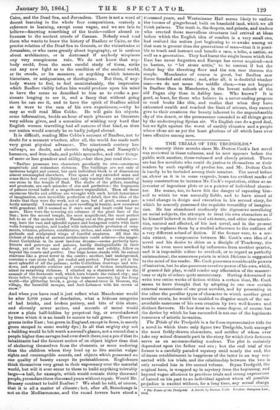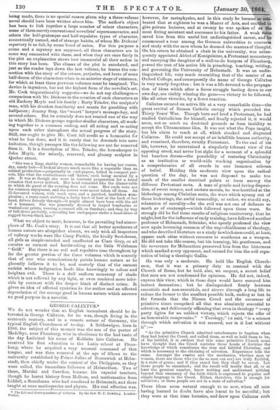THE TRIALS OF THE TREDGOLDS.*
IT is scarcely three months since Mr. Dutton Cook's last novel was reviewed in these columns, and lie now appears before the public with another, three-volumed and closely printed. There are but few novelists who could do justice to themselves or their readers by such rapidity of producion, and Mr. Dutton Cook is hardly to be included among their number. The novel before us, clever as it is in some respects, bears too evident marks of hasty construction to increase Mr. Cook's reputation, either as an inventor of ingenious plots or as a painter of individual charac- ter. He seems, too, to have felt the danger of repeating him- self to which he was naturally liable, and to have aimed at a total change in design and execution in his second story, for which he scarcely possessed the requisite versatility of imagina- tion. He has abandoned studiously the digressive moralizing on social subjects, the attempts to treat his own characters as if he himself believed in their real existence, and other characteris- tics, natural and affected, of his last novel, and in the present story he replaces them by a studied adherence to the outlines of a very different school of fiction. If the former were, to a cer- tain extent, a compromise between Mr. Cook's own idea of a novel and his desire to shine as a disciple of Thackeray, the latter is even more marked by influences from another quarter, and it is impossible either to overlook, or to regard as perfectly unintentional, the numerous points in which Dickens is suggested to the mind of the reader. Mr. Cook possesses considerable powers of imitation, but he also possesses creative power of his own, which, if granted fair play, would render any affectation of the manner- isms or style of others quite unnecessary. Having determined to write two entire works of fiction within a certain time, Mr. Cook seems to have thought that by adopting in one case certain external mannerisms of one great novelist, and by presenting in the other the peculiar types of character in which another great novelist excels, he would be enabled to disguise much of the un- avoidable sameness of his own creation by two well-known and distinct flavours. He has done so in some degree, of course, but the device by which he has succeeded is not one of the legitimate resources of artistic invention.
The Trials of the Tredgolds is a far from representative title for a novel in which there only figure two Tredgolds, both amongst the most feebly-drawn characters, and neither of whom ever take any actual dramatic part in the story for which their fortunes serve as an accommodating nucleus. The plot is certainly dependent upon the father and son ; but the real trial of the former is a carefully paraded mystery until nearly the end, the ultimate establishment in happiness of the latter in no way con-
nected with his trials, and the relationship between the two is only revealed late in the second volume. Bryan Tredgold, the original hero, is wrapped up in mystery from the beginning, and beyond vague allusions to previous trials and strong expressions of hatred on his part to an individual against whom all possible prejudice is excited without, for a long time, any actual charge
* The Trials of the Tredgolds, A Novel, by Dutton Cook. London: Sampson Law, 1854.
being made, there is no special reason given why a three-volume novel should have been written about him. The author's object has been to link together a large number of minor characters, some of them merely conventional novelists' supernumeraries, and others the half-grotesque and half-repulsive types of character, eccentrically named, and of strange habits, of whom Mr. Dickens' repertory is so full, by some bond of union. For this purpose a crime and a mystery are supposed, all these characters are in some way connected with them, and when they are once fairly in the plot an explanation shows how immaterial all their action in this story has been. The climax of the plot is antedated, and just as the reader lays down the last volume, he learns the con- nection with the story of the crimes, perjuries, and loves of some half-dozen of the characters when in an anterior stage of existence, for which at least three previous volumes must be imagined. The device is ingenious, but not the highest form of the novelist's art. Mr. Cook unquestionably suggests—we do not say challenges— comparison with Mr. Dickens in the creation of such characters as old Zaehery Moyle and his family ; Barty Trinder, the sculptor's man, with his drunken familiarity and mania for gambling with halfpence ; Jemmy Step, the "smart" lawyer's message-boy, and several others. But he certainly does not remind one of the way in which Mr. Dickens groups together similar characters, all work- ing together to a common ending, and all acting and re-acting upon each other throughout the actual progress of the story. Still, one ought to give Mr. Cook full credit as a humourist for what he has done, and it is rarely that he descends into mere imitation, though passages like the following are not far removed from it. It is a description of Mrs. Trinder, the housekeeper to John Moyle, the miserly, reserved, and gloomy sculptor in Quebec street.
"She was a limp, shabby woman, remarkable for having her coarse, dry, sandy hair—it looked always much more like a vegetable than an animal production—perpetually in curl-papers, folded in compact par- cels, like what the confectioners call 'kisses,' each being secured by a pin. It was as though she were in constant preparation for a festal occasion that never arrived. Her head remained like the dinner-table to which the guest of the evening does not come. Her curls were not for common enjoyment, and the covers were never taken off them. An ill-favoured woman, with weak eyes, and a parched, healthless com- plexion; a rusty comb stabbing a dusty knob of hair at the back of her head, driven fiercely through—it might almost have been with the aid of a hammer. She was generally dressed in frayed bombazine or washed-out prints, wearing a creased silk on Sundays; and then, by way of full-dress probably, concealing her curl-papers under a head-dress of ragged brown-black lace."
'What we object to most, however, is the prevailing bad atmos- phere of Mr. Cook's story. It is not that all better specimens of human nature are altogether absent, we only wish all inspectors of railway works were like Clany Buckle, the kindly Scotchman, all girls as simple-minded and unaffected as Clare Grey, or all curates as earnest and hardworking as the little Welshman Griff." But there is an evil and repulsive tone throughout by far the greater portion of the three volumes which is scarcely that of one who conscientiously paints human nature as he gloomily believes it to be, and scarcely that of the earnest satirist whose indignation leads him knowingly to colour and heighten evil. There is a dull uniform monotony of shade which is not relieved by any light, or even rendered more toler- able by contrast with the deeper black of distinct crime. It gives an idea of affected cynicism in the author and an affected depreciation of the average good in human nature which answers no good purpose in a novelist.































 Previous page
Previous page